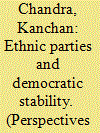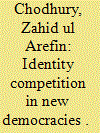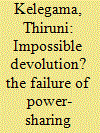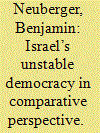|
|
|
Sort Order |
|
|
|
Items / Page
|
|
|
|
|
|
|
| Srl | Item |
| 1 |
ID:
065310


|
|
|
| 2 |
ID:
140307


|
|
|
|
|
| Summary/Abstract |
Literature on the role of social cleavages in stabilising democratic politics shows that during the initial period of democratisation voters tend to get cues from their core identities, and thus vote along identity lines. As a result, in multicultural societies ethnic parties emerge to take part in elections. But the literature does not indicate how identities compete with each other. Particularly, which (source of) identity – among a possible range of identities such as ethnicity, language, race and religion – does a better job in stabilising democracies? This comparative study combines analyses of cross-country fractionalisation, political volatility and World Value Surveys data with case studies of four Muslim majority countries – Turkey, Pakistan, Nigeria and Bangladesh – to demonstrate that non-religious identities stabilise democracies during the initial period of democratisation, while the religious identity (Islam) gradually trumps others as the political system stabilises over time.
|
|
|
|
|
|
|
|
|
|
|
|
|
|
|
|
| 3 |
ID:
138126


|
|
|
|
|
| Summary/Abstract |
The concept of a ‘primordial homeland’ has been at the centre of Sri Lanka’s armed struggle, in which both Sinhalese and Tamil nationalisms have used claims of ancient and ethnically determined territories to justify their right to self-determination, territorial sovereignty and armed struggle. Through an analysis of historical power-sharing arrangements and the subsequent failures, this article will examine why there has been much difficulty in adapting power-sharing arrangements to the rigidity of the hegemonic ethnic order of Sri Lanka and how this, in turn, has had detrimental consequences for democratic stability and peace making. While recognising the role played by various international actors in pushing for power sharing in Sri Lanka, the article concludes with an analysis of India’s role in this debate, while analysing how devolution has become an important factor in shaping India’s foreign policy towards Sri Lanka.
|
|
|
|
|
|
|
|
|
|
|
|
|
|
|
|
| 4 |
ID:
175465


|
|
|
|
|
| Summary/Abstract |
This article raises the question whether Israel is a stable or an unstable democracy. Its conclusion – based on a theoretical analysis that relates to variables such as the legitimacy of the regime, its effectiveness, the degree of general consensus it enjoys in society at large and amongst the elites, its party system and polarisation, its socioeconomic structure, the centrality of security issues, its constitutional structure and electoral system, and the international environment – is that it is unstable. The article’s approach is comparative and relates Israel to historical case studies, like post-World War I Weimar Germany, Italy, Britain and the US; post-World War II Germany, France, Italy, and Spain; the newly democratic states of Eastern Europe; and the Third World.
|
|
|
|
|
|
|
|
|
|
|
|
|
|
|
|
|
|
|
|
|